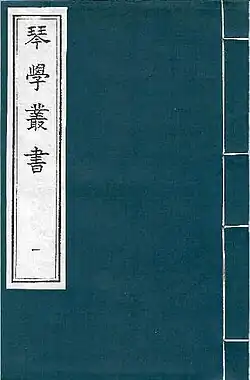Qinpu
Qinpu (simplified Chinese: 琴谱; traditional Chinese: 琴譜; pinyin: qínpǔ; Jyutping: kam4 pou2) are tablature score collections for the guqin, a Chinese musical instrument.

Front cover of the first folio of the facsimile of Qinxue Congshu
Description
Qinpu are collections of tablatures of music for the guqin. In the past, music was passed on from teacher to student. Only recently has tablature been written down, often to preserve music or as a reference book. Tablature comes in form of individual pieces and collections. Collections often have explanations for fingering, background information, musical analyses, and other additional information attached to them.
Different types of qinpu
There are several different types of qinpu one can obtain.
- Original editions are qinpu printed at the original time of publication, or re-issues during the past. These are mostly kept in libraries and private collections. Since they are original, they tend to be fragile.
- Photographic reprints is basically a scan of the original qinpu and reduced size reprint in modern binding. The most famous is the Qinqu Jicheng.
- Lithographic facsimiles are becoming more popular. The original qinpu is scanned, then it is lithographically printed on xuan paper. They are bound in traditional Chinese book binding method.
- Modern reset editions appeared after 2005. These have modern typographic elements and are often reset using more recent editions or handcopies of original qinpu.
See also
References
- Please see: References section in the guqin article for a full list of references used in all qin related articles.
- Zha, Fuxi (1958). Cunjian Guqin Qupu Jilan 【存見古琴曲譜輯覽】. Beijing: The People's Music Press. ISBN 7-103-02379-4.
- Christopher Evan's site Zha Fuxi's list of tablature collections in pinyin alphabetical order.
- John Thompson: Guqin Handbooks A chronological list with more detailed listing and links.
This article is issued from Wikipedia. The text is licensed under Creative Commons - Attribution - Sharealike. Additional terms may apply for the media files.